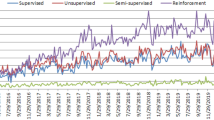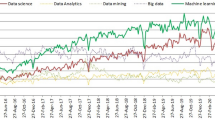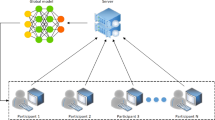Abstract
Federated machine learning (Fed ML) is a new distributed machine learning technique using clients’ local data applied to collaboratively train a global model without transmitting the datasets. Nodes, the participating devices in the ML training, only send parameter updates (e.g., weight updates in the case of neural networks), which are fused together by the server to build the global model without compromising raw data privacy. Fed ML guarantees its confidentiality by not divulging node data to third party, central servers. Privacy of data is a crucial network security aspect of Fed ML that will enable the technique for use in the context of data-sensitive Internet of Things (IoT) and mobile applications (including smart geo-location and smart grid infrastructure). However, most IoT and mobile devices are particularly energy constrained, which requires optimization of the Fed ML process for efficient training tasks and optimized power consumption. This paper, to the best of our knowledge, is the first Systematic Mapping Study (SMS) on Fed ML for energy constrained devices. First, we selected a total of 67 from 800 papers that satisfy our criteria, then provide a structured overview of the field using a set of carefully chosen research questions. Finally, we attempt to offer an analysis of the state-of-the-art Fed ML techniques and outline potential recommendations for the research community.












Similar content being viewed by others
Data availability
No additional data were used in the study besides the list of the papers retrieved from public databases as shown in the process description.
References
McMahan, H.B., Moore, E., Ramage, D., y Arcas, B.A.: Federated learning of deep networks using model averaging. arXiv preprint https://arxiv.org/abs/1602.05629 (2016)
Konečnỳ, J., McMahan, H.B., Ramage, D., Richtárik, P.: Federated optimization: distributed machine learning for on-device intelligence. arXiv preprint https://arxiv.org/abs/1610.02527 (2016)
Reisizadeh, A., Mokhtari, A., Hassani, H., Jadbabaie, A., Pedarsani, R.: FedPAQ: a communication-efficient federated learning method with periodic averaging and quantization. In: International Conference on Artificial Intelligence and Statistics, pp. 2021–2031. PMLR (2020)
Mrad, I., Samara, L., Abdellatif, A.A., Al-Abbasi, A.O., Hamila, R., Erbad, A.: Federated learning for UAV swarms under class imbalance and power consumption constraints. In: 2021 IEEE Global Communications Conference (GLOBECOM), pp. 1–6 (2021)
Shurdi, O., Ruçi, L., Biberaj, A., Mesi, G.: 5G energy efficiency overview. Eur. Sci. J. 17, 315–327 (2021)
Cisco, V.: Cisco visual networking index: forecast and trends, 2017–2022. White Pap. 1, 1 (2018)
Fettweis, G., Zimmermann, E.: ICT energy consumption-trends and challenges. In: Proceedings of the 11th International Symposium on Wireless Personal Multimedia Communications, vol. 2, p. 6. Citeseer (2008)
Kharote, P.A., Satone, M.P.: WSN: energy aware sensor node design. Int. J. Emerg. Trends Sci. Technol. 1 (2014)
Kandris, D., Nakas, C., Vomvas, D., Koulouras, G.: Applications of wireless sensor networks: an up-to-date survey. Appl. Syst. Innov. 3(1), 14 (2020)
Lo, S.K., Lu, Q., Wang, C., Paik, H., Zhu, L.: A systematic literature review on federated machine learning: from a software engineering perspective. arXiv preprint https://arxiv.org/abs/2007.11354 (2020)
Liu, Y., Zhang, L., Ge, N., Li, G.: A systematic literature review on federated learning: from a model quality perspective. arXiv https://arxiv.org/abs/2012.01973 (2020)
Lim, W.Y.B., Luong, N.C., Hoang, D.T., Jiao, Y., Liang, Y..-C., Yang, Q., Niyato, D., Miao, C.: Federated learning in mobile edge networks: a comprehensive survey. IEEE Commun. Surv. Tutor. 22(3), 2031–2063 (2020)
Aledhari, M., Razzak, R., Parizi, R.M., Saeed, F.: Federated learning: a survey on enabling technologies, protocols, and applications. IEEE Access 8, 140699–140725 (2020)
Briggs, C., Fan, Z., Andras, P.: A review of privacy-preserving federated learning for the internet-of-things. arXiv e-prints, p. arXiv–2004 (2020)
Imteaj, A., Thakker, U., Wang, S., Li, J., Amini, M.H.: A survey on federated learning for resource-constrained IoT devices. IEEE Internet Things J. 9(1), 1–24 (2021)
Briggs, C., Fan, Z., András, P.: A review of privacy-preserving federated learning for the internet-of-things. https://arxiv.org/abs/Learning (2020)
Li, T., Sahu, A.K., Talwalkar, A., Smith, V.: Federated learning: challenges, methods, and future directions. IEEE Signal Process. Mag. 37(3), 50–60 (2020)
Zhao, Y., Li, M., Lai, L., Suda, N., Civin, D., Chandra, V.: Federated learning with non-iid data. arXiv preprint https://arxiv.org/abs/1806.00582 (2018)
Yang, C., Wang, Q., Xu, M., Wang, S., Bian, K., Liu, X.: Heterogeneity-aware federated learning. arXiv preprint https://arxiv.org/abs/2006.06983 (2020)
Li, L., Shi, D., Hou, R., Li, H., Pan, M., Han, Z.: To talk or to work: flexible communication compression for energy efficient federated learning over heterogeneous mobile edge devices. arXiv preprint https://arxiv.org/abs/2012.11804 (2020)
Diao, E., Ding, J., Tarokh, V.: HeteroFL: computation and communication efficient federated learning for heterogeneous clients. arXiv preprint https://arxiv.org/abs/2010.01264 (2020)
Martinez, B., Monton, M., Vilajosana, I., Prades, J.D.: The power of models: modeling power consumption for IoT devices. IEEE Sens. J. 15(10), 5777–5789 (2015)
Konečnỳ, J., McMahan, H.B., Yu, F.X., Richtárik, P., Suresh, A.T., Bacon, D.: Federated learning: strategies for improving communication efficiency. arXiv preprint https://arxiv.org/abs/1610.05492 (2016)
Sattler, F., Wiedemann, S., Müller, K.-R., Samek, W.: Robust and communication-efficient federated learning from non-iid data. IEEE Trans. Neural Netw. Learn. Syst. 31(9), 3400–3413 (2019)
Chen, Y., Sun, X., Jin, Y.: Communication-efficient federated deep learning with layerwise asynchronous model update and temporally weighted aggregation. IEEE Trans. Neural Netw. Learn. Syst. 31(10), 4229–4238 (2019)
Foukas, X., Kontovasilis, K., Marina, M.K.: Short-range cooperation of mobile devices for energy-efficient vertical handovers. Wirel. Commun. Mob. Comput. (2018). https://doi.org/10.1155/2018/3280927
Kairouz, P., McMahan, H.B., Avent, B., Bellet, A., Bennis, M., Bhagoji, A.N., Bonawitz, K., Charles, Z., Cormode, G., Cummings, R., et al.: Advances and open problems in federated learning. arXiv preprint https://arxiv.org/abs/1912.04977 (2019)
Ma, Z., Xu, Y., Xu, H., Meng, Z., Huang, L., Xue, Y.: Adaptive batch size for federated learning in resource-constrained edge computing. IEEE Trans. Mob. Comput. 37(6), 1205–1221 (2021)
Mills, J., Hu, J., Min, G.: Communication-efficient federated learning for wireless edge intelligence in IoT. IEEE Internet Things J. 7(7), 5986–5994 (2019)
Zhang, Y., Sun, B., Xiao, Y., Xiao, R., Wei, Y.: Feature augmentation for imbalanced classification with conditional mixture WGANS. Signal Process.: Image Commun. 75, 89–99 (2019)
Yao, X., Huang, T., Wu, C., Zhang, R., Sun, L.: Towards faster and better federated learning: a feature fusion approach. In: 2019 IEEE International Conference on Image Processing (ICIP), pp. 175–179. IEEE (2019)
Yao, X., Huang, C., Sun, L.: Two-stream federated learning: reduce the communication costs. In: 2018 IEEE Visual Communications and Image Processing (VCIP), pp. 1–4. IEEE (2018)
Bouacida, N., Hou, J., Zang, H., Liu, X.: Adaptive federated dropout: improving communication efficiency and generalization for federated learning. arXiv preprint. https://arxiv.org/abs/2011.04050 (2020)
Jiang, Y., Wang, S., Ko, B.J., Lee, W.-H., Tassiulas, L.: Model pruning enables efficient federated learning on edge devices. arXiv preprint https://arxiv.org/abs/1909.12326 (2019)
Xu, W., Fang, W., Ding, Y., Zou, M., Xiong, N.: Accelerating federated learning for IoT in big data analytics with pruning, quantization and selective updating. IEEE Access 9, 38457–38466 (2021)
Huo, Z., Yang, Q., Gu, B., Huang, L.C., et al.: Faster on-device training using new federated momentum algorithm. arXiv preprint https://arxiv.org/abs/2002.02090 (2020)
Liu, L., Zhang, J., Song, S., Letaief, K.B.: Client-edge-cloud hierarchical federated learning. In: ICC 2020–2020 IEEE International Conference on Communications (ICC), pp. 1–6. IEEE (2020)
Chai, Z., Chen, Y., Zhao, L., Cheng, Y., Rangwala, H.: FedAT: a communication-efficient federated learning method with asynchronous tiers under non-iid data. arXiv preprint https://arxiv.org/abs/2010.05958 (2020)
Malekijoo, A., Fadaeieslam, M.J., Malekijou, H., Homayounfar, M., Alizadeh-Shabdiz, F., Rawassizadeh, R.: Fedzip: a compression framework for communication-efficient federated learning. arXiv preprint https://arxiv.org/abs/2102.01593 (2021)
Alistarh, D., Grubic, D., Li, J., Tomioka, R., Vojnovic, M.: QSGD: communication-efficient SGD via gradient quantization and encoding. Adv. Neural Inf. Process. Syst. 30, 1709–1720 (2017)
Xu, J., Du, W., Jin, Y., He, W., Cheng, R.: Ternary compression for communication-efficient federated learning. IEEE Trans. Neural Netw. Learn. Syst. (2020). https://doi.org/10.1109/TNNLS.2020.3041185
Jhunjhunwala, D., Gadhikar, A., Joshi, G., Eldar, Y.C.: Adaptive quantization of model updates for communication-efficient federated learning. In ICASSP 2021–2021 IEEE International Conference on Acoustics, Speech and Signal Processing (ICASSP), pp. 3110–3114. IEEE (2021)
Mao, Y., Zhao, Z., Yan, G., Liu, Y., Lan, T., Song, L., Ding, W.: Communication efficient federated learning with adaptive quantization. arXiv preprint https://arxiv.org/abs/2104.06023 (2021)
Shi, S., Chu, X., Cheung, K.C., See, S.: Understanding top-k sparsification in distributed deep learning. arXiv preprint https://arxiv.org/abs/1911.08772 (2019)
Han, P., Wang, S., Leung, K.K.: Adaptive gradient sparsification for efficient federated learning: an online learning approach. arXiv preprint https://arxiv.org/abs/2001.04756 (2020)
Sun, H., Li, S., Yu, F.R., Qi, Q., Wang, J., Liao, J.: Toward communication-efficient federated learning in the internet of things with edge computing. IEEE Internet Things J. 7(11), 11053–11067 (2020)
Rothchild, D., Panda, A., Ullah, E., Ivkin, N., Stoica, I., Braverman, V., Gonzalez, J., Arora, R.: FetchSGD: communication-efficient federated learning with sketching. In: International Conference on Machine Learning, pp. 8253–8265. PMLR (2020)
Siblini, W., Meyer, F., Kuntz, V.: A count-sketch to reduce memory consumption when training a model with gradient descent. In: 2019 International Joint Conference on Neural Networks (IJCNN), pp. 1–8. IEEE (2019)
Qiao, Z., Yu, X., Zhang, J., Letaief, K.B.: Communication-efficient federated learning with dual-side low-rank compression. arXiv preprint https://arxiv.org/abs/2104.12416 (2021)
Lian, Z., Wang, W., Su, C.: Communication-efficient and optimized federated learning with local differential privacy. In: ICC 2021-IEEE International Conference on Communications, pp. 1–6. IEEE (2021)
Wang, S., Tuor, T., Salonidis, T., Leung, K.K., Makaya, C., He, T., Chan, K.: Adaptive federated learning in resource constrained edge computing systems. IEEE J. Sel. Areas Commun. 37(6), 1205–1221 (2019)
Wang, H., Qu, Z., Guo, S., Gao, X., Li, R., Ye, B.: Intermittent pulling with local compensation for communication-efficient distributed learning. IEEE Trans. Emerg. Top. Comput. (2020). https://doi.org/10.1109/TETC.2020.3043300
Sattler, F., Marban, A., Rischke, R., Samek, W.: Communication-efficient federated distillation. arXiv preprint https://arxiv.org/abs/2012.00632 (2020)
Jeong, E., Oh, S., Kim, H., Park, J., Bennis, M., Kim, S.-L.: Communication-efficient on-device machine learning: federated distillation and augmentation under non-iid private data. arXiv preprint https://arxiv.org/abs/1811.11479 (2018)
Park, J., Wang, S., Elgabli, A., Oh, S., Jeong, E., Cha, H., Kim, H., Kim, S.-L., Bennis, M.: Distilling on-device intelligence at the network edge. arXiv preprint https://arxiv.org/abs/1908.05895 (2019)
Itahara, S., Nishio, T., Koda, Y., Morikura, M., Yamamoto, K.: Distillation-based semi-supervised federated learning for communication-efficient collaborative training with non-iid private data. arXiv preprint https://arxiv.org/abs/2008.06180 (2020)
Seo, H., Park, J., Oh, S., Bennis, M., Kim, S.-L.: Federated knowledge distillation. arXiv preprint https://arxiv.org/abs/2011.02367 (2020)
Hinton, G., Vinyals, O., Dean, J.: Distilling the knowledge in a neural network. arXiv preprint https://arxiv.org/abs/1503.02531 (2015)
Nishio, T., Yonetani, R.: Client selection for federated learning with heterogeneous resources in mobile edge. In: ICC 2019–2019 IEEE International Conference on Communications (ICC), pp. 1–7. IEEE (2019)
Anh, T.T., Luong, N.C., Niyato, D., Kim, D.I., Wang, L.-C.: Efficient training management for mobile crowd-machine learning: a deep reinforcement learning approach. IEEE Wirel. Commun. Lett. 8(5), 1345–1348 (2019)
Rahman, S.A., Tout, H., Mourad, A., Talhi, C.: FedMCCS: multi criteria client selection model for optimal IoT federated learning. IEEE Internet Things J. 8(6), 4723–4735 (2020)
Wu, W., He, L., Lin, W., Mao, R., Maple, C., Jarvis, S.A.: SAFA: a semi-asynchronous protocol for fast federated learning with low overhead. IEEE Trans. Comput. 70(5), 655–668 (2020)
Sarkar, D., Rai, S., Narang, A.: CatFedAvg: optimising communication-efficiency and classification accuracy in federated learning. arXiv preprint https://arxiv.org/abs/2011.07229 (2020)
Duan, M., Liu, D., Chen, X., Tan, Y., Ren, J., Qiao, L., Liang, L.: Astraea: self-balancing federated learning for improving classification accuracy of mobile deep learning applications. In: 2019 IEEE 37th International Conference on Computer Design (ICCD), pp. 246–254. IEEE (2019)
Wang, Z., Xu, H., Liu, J., Huang, H., Qiao, C., Zhao, Y.: Resource-efficient federated learning with hierarchical aggregation in edge computing. In: IEEE INFOCOM 2021-IEEE Conference on Computer Communications, pp. 1–10. IEEE (2021)
Jeon, J., Park, S., Choi, M., Kim, J., Kwon, Y..-B., Cho, S.: Optimal user selection for high-performance and stabilized energy-efficient federated learning platforms. Electronics 9(9), 1359 (2020)
Zaw, C.W., Pandey, S.R., Kim, K., Hong, C.S.: Energy-aware resource management for federated learning in multi-access edge computing systems. IEEE Access 9, 34938–34950 (2021)
Mo, X., Xu, J.: Energy-efficient federated edge learning with joint communication and computation design. arXiv preprint https://arxiv.org/abs/2003.00199 (2020)
Jiang, J., Hu, L., Hu, C., Liu, J., Wang, Z.: Bacombo–bandwidth-aware decentralized federated learning. Electronics 9(3), 440 (2020)
Sun, Y., Zhou, S., Gündüz, D.: Energy-aware analog aggregation for federated learning with redundant data. In: ICC 2020–2020 IEEE International Conference on Communications (ICC), pp. 1–7. IEEE (2020)
Yu, R., Li, P.: Toward resource-efficient federated learning in mobile edge computing. IEEE Netw. 35(1), 148–155 (2021)
Elgabli, A., Park, J., Bedi, A.S., Issaid, C.B., Bennis, M., Aggarwal, V.: Q-GADMM: quantized group ADMM for communication efficient decentralized machine learning. IEEE Trans. Commun. 69(1), 164–181 (2020)
Ansari, R.I., Chrysostomou, C., Hassan, S.A., Guizani, M., Mumtaz, S., Rodriguez, J., Rodrigues, J.J.P.C.: 5G D2D networks: techniques, challenges, and future prospects. IEEE Syst. J. 12, 3970–3984 (2018)
Anamuro, C.V., Varsier, N., Schwoerer, J., Lagrange, X.: Distance-aware relay selection in an energy-efficient discovery protocol for 5G D2D communication. IEEE Trans. Wirel. Commun. 20, 4379–4391 (2021)
García-Martín, E., Rodrigues, C.F., Riley, G., Grahn, H.: Estimation of energy consumption in machine learning. J. Parallel Distrib. Comput. 134, 75–88 (2019)
Hothorn, T., Lausen, B.: Double-bagging: combining classifiers by bootstrap aggregation. Pattern Recogn. 36(6), 1303–1309 (2003)
Frankle, J., Carbin, M.: The lottery ticket hypothesis: finding sparse, trainable neural networks. arXiv preprint https://arxiv.org/abs/1803.03635 (2018)
Gordienko, Y., Kochura, Y., Taran, V., Gordienko, N., Bugaiov, A., Stirenko, S.: Adaptive iterative pruning for accelerating deep neural networks. In: 2019 XIth International Scientific and Practical Conference on Electronics and Information Technologies (ELIT), pp. 173–178. IEEE (2019)
Pham, H., Guan, M., Zoph, B., Le, Q., Dean, J.: Efficient neural architecture search via parameters sharing. In: International Conference on Machine Learning, pp. 4095–4104. PMLR (2018)
Liang, X., Di, S., Tao, D., Li, S., Li, S., Guo, H., Chen, Z., Cappello, F.: Error-controlled lossy compression optimized for high compression ratios of scientific datasets. In 2018 IEEE International Conference on Big Data (Big Data), pp. 438–447. IEEE (2018)
Jin, S., Li, G., Song, S.L., Tao, D.: A novel memory-efficient deep learning training framework via error-bounded lossy compression. arXiv preprint https://arxiv.org/abs/2011.09017 (2020)
Liu, Z., Huang, X., Hu, Z., Khan, M.K., Seo, H., Zhou, L.: On emerging family of elliptic curves to secure internet of things: ECC comes of age. IEEE Trans. Depend. Secur. Comput. 14, 237–248 (2017)
Gentry, C., et al.: A Fully Homomorphic Encryption Scheme, vol. 20. Stanford University, Stanford (2009)
Al-Rubaie, M., Chang, J.M.: Privacy-preserving machine learning: threats and solutions. IEEE Secur. Priv. 17, 49–58 (2019)
Rakin, A.S., He, Z., Fan, D.: TBT: targeted neural network attack with Bit Trojan. In: 2020 IEEE/CVF Conference on Computer Vision and Pattern Recognition (CVPR), pp. 13195–13204 (2020)
Ren, H., Deng, J., Xie, X.: GRNN: generative regression neural network–a data leakage attack for federated learning. ACM Trans. Intell. Syst. Technol. 13(4), 1–24 (2022)
Wei, K., Li, J., Ding, M., Ma, C., Yang, H.H., Farokhi, F., Jin, S., Quek, T.Q., Poor, H.V.: Federated learning with differential privacy: algorithms and performance analysis. IEEE Trans. Inf. Forensics Secur. 15, 3454–3469 (2020)
Loukil, F., Ghedira, C., Boukadi, K., Benharkat, A.-N.: Privacy-preserving IoT data aggregation based on blockchain and homomorphic encryption. Sensors (Basel, Switzerland) 21, 2452 (2021)
Bhandari, R., Kirubanand, V.B.: Enhanced encryption technique for secure IoT data transmission. Int. J. Electr. Comput. Eng. 9(5), 3732 (2019)
Shahidinejad, A., Ghobaei-Arani, M., Souri, A., Shojafar, M., Kumari, S.: Light-edge: a lightweight authentication protocol for IoT devices in an edge-cloud environment. IEEE Consum. Electron. Mag. 11(2), 57–63 (2021)
Kunchok, T., KirubanandV, B.: A lightweight hybrid encryption technique to secure IoT data transmission. Int. J. Eng. Technol. 7, 236 (2018)
Ma, X., Jiang, Q., Shojafar, M., Alazab, M., Kumar, S., Kumari, S.: DisBezant: secure and robust federated learning against byzantine attack in IoT-enabled MTS. IEEE Trans. Intell. Transport. Syst. (2022). https://doi.org/10.1109/TITS.2022.3152156
Da Silva, F.Q., Suassuna, M., França, A.C.C., Grubb, A.M., Gouveia, T.B., Monteiro, C.V., dos Santos, I.E.: Replication of empirical studies in software engineering research: a systematic mapping study. Empir. Softw. Eng. 19(3), 501–557 (2014)
Kitchenham, B., Charters, S.: Guidelines for performing systematic literature reviews in software engineering (2007)
Funding
No funding was received for conducting this study.
Author information
Authors and Affiliations
Contributions
All authors have participated in conception and the analysis of the study in addition to writing the paper. REM has also done the paper selection and classification. All authors read and approved the final manuscript.
Corresponding author
Ethics declarations
Conflict of interest
The authors declare that they have no conflict of interest.
Ethical approval
This work does not raise any ethical issues.
Informed consent
None.
Additional information
Publisher's Note
Springer Nature remains neutral with regard to jurisdictional claims in published maps and institutional affiliations.
Appendix
Appendix
This appendix lists all papers included in our study, tagged from P1 to P67 (chronological order) (Table 5).
Rights and permissions
Springer Nature or its licensor holds exclusive rights to this article under a publishing agreement with the author(s) or other rightsholder(s); author self-archiving of the accepted manuscript version of this article is solely governed by the terms of such publishing agreement and applicable law.
About this article
Cite this article
El Mokadem, R., Ben Maissa, Y. & El Akkaoui, Z. Federated learning for energy constrained devices: a systematic mapping study. Cluster Comput 26, 1685–1708 (2023). https://doi.org/10.1007/s10586-022-03763-4
Received:
Revised:
Accepted:
Published:
Issue Date:
DOI: https://doi.org/10.1007/s10586-022-03763-4




